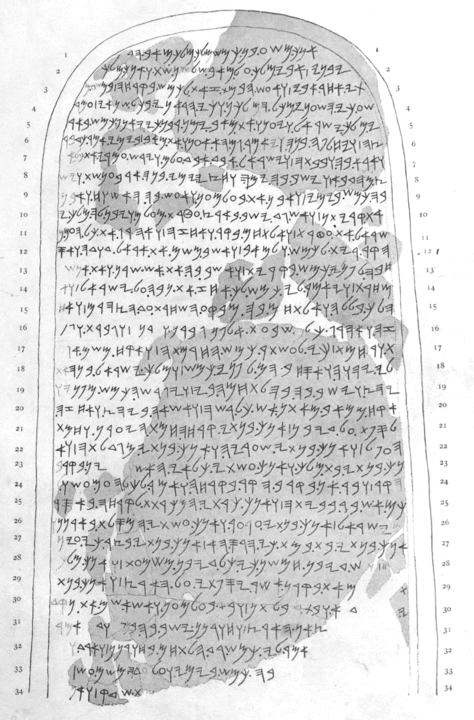The Mesha Stele (also known as the Moabite Stone) is an ancient inscribed stone monument that dates back to the 9th century BCE. It was discovered in 1868 in the ancient city of Dhiban, Jordan, which was formerly known as the Moabite city of Dibon.
The Mesha Stele is notable for being one of the most significant and extensive ancient inscriptions in the Hebrew language. The text on the stele describes the military victories and accomplishments of King Mesha of Moab, who was a ruler in the region during the 9th century BCE.
The stele is approximately 1.1 meters in height and 60 cm wide, and it is inscribed with 34 lines of text in the Moabite language, which is similar to Hebrew. The text on the stele mentions various gods and goddesses of the Moabite pantheon, as well as the god Yahweh, who was worshiped by the Israelites.
The Mesha Stele provides important historical information about the ancient kingdom of Moab and its relations with neighboring kingdoms, particularly with the Israelites. It also sheds light on the language, religion, and culture of the Moabites during this period.
Today, the Mesha Stele is considered to be one of the most important archaeological discoveries from the ancient Near East, and it is on display at the Louvre Museum in Paris, France.



I am Mesha, son of Chemosh-gad, king of Moab, the Dibonite. My father reigned over Moab thirty years, and I have reigned after my father. And I have built this sanctuary for Chemosh in Karchah, a sanctuary of salvation, for he saved me from all aggressors, and made me look upon all mine enemies with contempt.
Omri was king of Israel, and oppressed Moab during many days, and Chemosh was angry with his aggressions. His son succeeded him, and he also said, I will oppress Moab. In my days he said, Let us go, and I will see my desire upon him and his house, and Israel said, I shall destroy it for ever. Now Omri took the land of Madeba, and occupied it in his day, and in the days of his son, forty years. And Chemosh had mercy on it in my time. And I built Baal-meon and made therein the ditch, and I built Kiriathaim.
And the men of Gad dwelled in the country of Ataroth from ancient times, and the king of Israel fortified Ataroth. I assaulted the wall and captured it, and killed all the warriors of the city for the well-pleasing of Chemosh and Moab, and I removed from it all the spoil, and offered it before Chemosh in Kirjath; and I placed therein the men of Siran, and the men of Mochrath. And Chemosh said to me, Go take Nebo against Israel, and I went in the night and I fought against it from the break of day till noon, and I took it: and I killed in all seven thousand men…women and maidens, for I devoted them to Ashtar-Chemosh; and I took from it the vessels of Jehovah, and offered them before Chemosh.
And the king of Israel fortified Jahaz, and occupied it, when he made war against me, and Chemosh drove him out before me, and I took from Moab two hundred men in all, and placed them in Jahaz, and took it to annex it to Dibon.
I built Karchah the wall of the forest, and the wall of the Hill. I have built its gates and I have built its towers. I have built the palace of the king, and I made the prisons for the criminals within the wall. And there were no wells in the interior of the wall in Karchah. And I said to all the people, ‘Make you every man a well in his house.’ And I dug the ditch for Karchah with the chosen men of Israel. I built Aroer, and I made the road across the Arnon. I built Beth-Bamoth for it was destroyed. I built Bezer for it was cut down by the armed men of Daybon, for all Daybon was now loyal; and I reigned from Bikran, which I added to my land. And I built Beth-Gamul, and Beth-Diblathaim…Beth Baal-Meon, and I placed there the poor people of the land.
And as to Horonaim, the men of Edom dwelt therein, on the descent from old. And Chemosh said to me, Go down, make war against Horonaim, and take it. And I assaulted it, And I took it, for Chemosh restored it in my days. Wherefore I made…. …year…and I….

